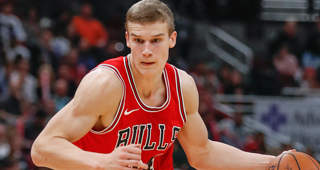I remember Rusty LaRue. I remember Corey Benjamin. I remember Kornel David, Keith Booth, Charles Jones, and Mario Bennett. I’ve seen Bulls that you couldn’t imagine. The 1999 Chicago professional basketball team was gutted of its championship glitz, its superstar glory, its mythological coaching staff. In the first definitively hubristic, atomic restructuring of several to come over the next two decades, the Bulls’ front office followed up Michael Jordan’s indelible cinema of sport with a minor league development squad, its roster full of create-a-player names led by fresh-from-NCAA coach Tim Floyd, who went on to accumulate a .280 career NBA winning percentage with the Bulls and the New Orleans Hornets.
I loved this. Ensconced in the hell-thresher that was middle school in Chicagoland, getting my ass beat by larger boys every day, I craved cultural product so obscure and competitively irredeemable that only I would want to get lost in it. The 1999 Bulls were the beginning of a basketball verisimilitude of losers, misfits, cast-aways and curmudgeons that I identified with infinitely more than I ever could with Jordan’s killers. Those title teams filled my heart and made the whole Midwest feel like it was my family, but as I aged what I wanted more from sports was hardcore bibliophilic escapism, a taxonomy all my own.
The 17-18 Bulls, living also in the wake of a seismic roster shift characterized by bad asset management and far worse personality management—led, also, by an unproven and primarily bumbling head coach straight from Iowa State University—are another basketball desert that only the most depraved, oblivion-seeking fan could find sustenance from. In the person of Finnish rookie Lauri Markkanen, a smooth-shooting seven-footer with unusual poise and determination for a 20-year-old, there is hope. But otherwise there is not any, and in Bullsland there is a compound of resentment over managerial manglings so thick that even Markkanen becomes difficult to enjoy.
It is important, in times like these, to make front offices not exist in your mind. To find the child inside of you who does not know a general manager’s name or care to; who would rather learn the statistics and biographies of whoever is on the team by heart, not taking the time to think of the shittily handled market permutations that brought them here. These athletes are human beings, above all—dudes who you might want to endear yourself to, regardless of whether they could be better at basketball and certainly regardless of the sour countenances of John Paxson and Gar Forman. Robin Lopez, Kris Dunn, Zach LaVine, and Quincy Pondexter probably don’t like these men a whole lot more than you do. We are in this with them; they are who we watch, who we share the losses with.
*Now* is when I begin to love the Bulls again. I cannot hold onto the pain of mistakes made forever, or think of my local NBA team like a business forever. They are the badly run bar that I drink from, but that bar is a place where people go to get neutral, to flatten their origins and projected futures into a present enjoyment of sport, however effectively it is performed. With America sinking into such an interminable mess—the blind spots of its thesis meeting their ultimate exposure amidst the garbage presidency and the information revolution—some things should be safe, for some moments, from turning into yet another allegory for how we got this all so wrong.
Fandom functions better as a place of refuge and bland positivity, the kind that feels impossible anywhere else. With the on-court faces of the Bulls’ latest failed empire (Butler, Rondo, Wade, Noah, Deng, Gasol, Rose; even Nikola Mirotic is unlikely to return) all faded away and Markkanen leading the new vanguard of probably-nots and maybes to a 2018 lottery pick, there is a fresh canvas to throw aspiration onto. In the Bulls’ reboot, however poorly it may have been managed, Chicago fans are given a split from entrenched mediocrity and a chance to pretend again. They aren’t winning and people aren’t watching, and it might be a decade before they win again. The Bulls spent six seasons beneath .500, after Jordan—and while the drop in relevance for the current team has been slower and less epically pronounced than it was then, lying so intentionally in the league’s gulch can feel again like an act of mercy for those in pathological search of new beginnings and bold hopes.
In a #ringz culture so defined by 1’s and 0’s, there is much release in burning down the middling garden to watch little sprouts grow. Self-acceptance is healthy, and Markkanen shoots out of the soil with rarely seen cohesion and color, ahead of schedule by even an insane optimist’s standards. Bulls fans eager to speculate about how GarPax will ruin everything around him are not wrong—they are familiar with history, and with the proven lack of accountability within the organization. To bank on this glowing zero of a roster shining all the way up to one championship trophy would be to abuse oneself. But after so many dashed dreams and so much stalled-out decay, it might be equally foolish to refuse to enjoy a moment of coming back to earth and slowly growing.



